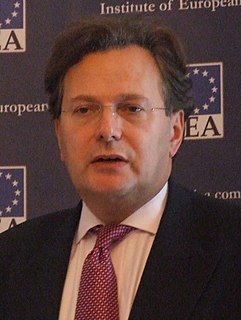BAE Systems plc (BAE) is a British multinational arms, security, and aerospace company based in London, England. It is the largest defence contractor in Europe, and ranked the seventh-largest in the world based on applicable 2021 revenues. As of 2017, it is the biggest manufacturer in Britain. Its largest operations are in the United Kingdom and United States, where its BAE Systems Inc. subsidiary is one of the six largest suppliers to the US Department of Defense. Other major markets include Australia, Canada, India, Saudi Arabia, Turkey, Qatar, Oman and Sweden, where Saudi Arabia is regularly among its top three sources of revenue. The company was formed on 30 November 1999 by the £7.7 billion purchase of and merger with Marconi Electronic Systems (MES)—the defence electronics and naval shipbuilding subsidiary of the General Electric Company plc (GEC)—by British Aerospace, an aircraft, munitions and naval systems manufacturer.
The Serious Fraud Office (SFO) is a non-ministerial government department of the Government of the United Kingdom that investigates and prosecutes serious or complex fraud and corruption in England, Wales and Northern Ireland. The SFO is accountable to the Attorney General for England and Wales, and was established by the Criminal Justice Act 1987, an Act of the Parliament of the United Kingdom.

Peter Henry Goldsmith, Baron Goldsmith is a British barrister and a former Attorney General for England and Wales and for Northern Ireland. On 22 June 2007, Goldsmith announced his resignation which took effect on 27 June 2007, the same day that Prime Minister Tony Blair, stepped down. Goldsmith was the longest serving Labour Attorney General. He is currently a Partner and head of European litigation practice at US law firm Debevoise & Plimpton and Vice Chairperson of the Hong Kong International Arbitration Centre.

Thomas Henry Bingham, Baron Bingham of Cornhill,, was an eminent British judge who was successively Master of the Rolls, Lord Chief Justice and Senior Law Lord. He was described as the greatest lawyer of his generation. Baroness Hale of Richmond observed that his pioneering role in the formation of the United Kingdom Supreme Court may be his most important and long-lasting legacy. Lord Phillips of Worth Matravers regarded Bingham as "one of the two great legal figures of my lifetime in the law". Lord Hope remembered Bingham as "the greatest jurist of our time".

Al Yamamah is the name of a series of record arms sales by the United Kingdom to Saudi Arabia, paid for by the delivery of up to 600,000 barrels (95,000 m3) of crude oil per day to the British government. The prime contractor has been BAE Systems and its predecessor British Aerospace. The first sales occurred in September 1985 and the most recent contract for 72 Eurofighter Typhoon multirole fighters was signed in August 2006.
Nolle prosequi, abbreviated nol or nolle pros, is legal Latin meaning "to be unwilling to pursue". In Commonwealth and US common law, it is used for prosecutors' declarations that they are voluntarily ending a criminal case before trial or before a verdict is rendered; it is a kind of motion to dismiss and contrasts with an involuntary dismissal.

Wafic Rida Saïd is a Syrian-Saudi-Canadian financier, businessman, and philanthropist, who has resided for many years in Monaco.

Campaign Against Arms Trade (CAAT) is a UK-based campaigning organisation working towards the abolition of the international arms trade. It was founded in 1974 by a coalition of peace groups. It has been involved in several high-profile campaigns, including a legal challenge against the Serious Fraud Office's decision to suspend a corruption investigation into BAE Systems in 2007. On 27 September 2012, it was honoured with a Right Livelihood Award for its "innovative and effective campaigning".

Leonard Hubert "Lennie" Hoffmann, Baron Hoffmann is a retired senior South African–British judge. He served as a Lord of Appeal in Ordinary from 1995 to 2009.
Duress in English law is a complete common law defence, operating in favour of those who commit crimes because they are forced or compelled to do so by the circumstances, or the threats of another. The doctrine arises not only in criminal law but also in civil law, where it is relevant to contract law and trusts law.

Regal (Hastings) Ltd v Gulliver[1942] UKHL 1, is a leading case in UK company law regarding the rule against directors and officers from taking personal advantage of a corporate opportunity in violation of their duty of loyalty to the company. The Court held that a director is in breach of his duties if he takes advantage of an opportunity that the corporation would otherwise be interested in but was unable to take advantage. However the breach could have been resolved by ratification by the shareholders, which those involved neglected to do.

Reynolds v Times Newspapers Ltd was a House of Lords case in English defamation law concerning qualified privilege for publication of defamatory statements in the public interest. The case provided the Reynolds defence, which could be raised where it was clear that the journalist had a duty to publish an allegation even if it turned out to be wrong.
The Corner House is a not for profit company limited by guarantee founded in 1997 in the United Kingdom. According to its website, it aims "to support democratic & community movements for environmental & social justice".

United Kingdom administrative law is part of UK constitutional law that is designed through judicial review to hold executive power and public bodies accountable under the law. A person can apply to the High Court to challenge a public body's decision if they have a "sufficient interest", within three months of the grounds of the cause of action becoming known. By contrast, claims against public bodies in tort or contract are usually limited by the Limitation Act 1980 to a period of 6 years. Almost any public body, or private bodies exercising public functions, can be the target of judicial review, including a government department, a local council, any Minister, the Prime Minister, or any other body that is created by law. The only public body whose decisions cannot be reviewed is Parliament, when it passes an Act. Otherwise, a claimant can argue that a public body's decision was unlawful in five main types of case: (1) it exceeded the lawful power of the body, used its power for an improper purpose, or acted unreasonably, (2) it violated a legitimate expectation, (3) failed to exercise relevant and independent judgement, (4) exhibited bias or a conflict of interest, or failed to give a fair hearing, and (5) violated a human right. As a remedy, a claimant can ask for the public body's decisions to be declared void and quashed, or it could ask for an order to make the body do something, or prevent the body from acting unlawfully. A court may also declare the parties' rights and duties, give an injunction, or compensation could also be payable in tort or contract.

The United Kingdom constitutional law concerns the governance of the United Kingdom of Great Britain and Northern Ireland. With the oldest continuous political system on Earth, the British constitution is not contained in a single code but principles have emerged over the centuries from statute, case law, political conventions and social consensus. In 1215, Magna Carta required the King to call "common counsel" or Parliament, hold courts in a fixed place, guarantee fair trials, guarantee free movement of people, and free the church from the state; it also enshrined the rights of "common" people to use the land. After the English Civil War and the Glorious Revolution 1688, Parliament won supremacy over the monarch, as well as the church and the courts, and the Bill of Rights 1689 recorded that the "election of members of Parliament ought to be free". The Act of Union 1707 unified England, Wales and Scotland, while Ireland was joined in 1800, but the Republic of Ireland formally separated between 1916 and 1921 through bitter armed conflict. By the Representation of the People Act 1928, almost every adult man and woman was finally entitled to vote for Parliament. The UK was a founding member of the International Labour Organization (ILO), the United Nations, the Commonwealth, the Council of Europe, and the World Trade Organization (WTO). The principles of parliamentary sovereignty, the rule of law, democracy and internationalism guide the UK's modern political system.

The Constitution of the United Kingdom or British constitution comprises the written and unwritten arrangements that establish the United Kingdom of Great Britain and Northern Ireland as a political body. Unlike in most countries, no attempt has been made to codify such arrangements into a single document. Thus, it is known as an uncodified constitution. This enables the constitution to be easily changed as no provisions are formally entrenched. However, the Supreme Court of the United Kingdom recognises that there are constitutional principles, including parliamentary sovereignty, the rule of law, democracy and upholding international law.

According to the British government, the United Kingdom of Great Britain and Northern Ireland and the Kingdom of Saudi Arabia have long been close allies. The origins of the relations date back to 1848 when Faisal bin Turki, ruler of the Second Saudi state, formally requested the support of the British Political Resident in Bushire for his representative in Trucial Oman.

Errors as to precedent facts, sometimes called jurisdictional facts, in Singapore administrative law are errors committed by public authorities concerning facts that must objectively exist or not exist before the authorities have the power to take actions or make decisions under legislation. If an error concerning a precedent fact is made, the statutory power has not been exercised lawfully and may be quashed by the High Court if judicial review is applied for by an aggrieved person. The willingness of the Court to review such errors of fact is an exception to the general rule that the Court only reviews errors of law.

Pickin v British Railways Board[1974] UKHL 1 is a UK constitutional law case, concerning parliamentary sovereignty.

Huang v Secretary of State for the Home Department [2007] UKHL 11 is a UK constitutional law case, concerning judicial review.













